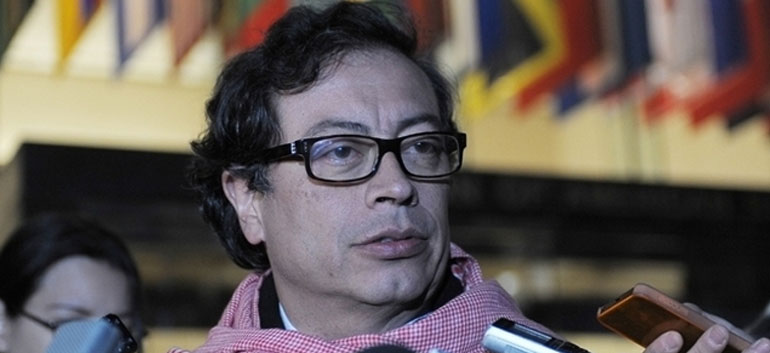Colombia’s Inspector General Alejandro Ordoñez reaffirmed a prior decision that would dismiss Bogota Mayor Gustavo Petro from office and ban him from holding any elected position for 15 years, according to a statement released Monday.
“The Disciplinary Hall of the Inspector General of the Nation…today confirmed the verdict of the incident of December 9, 2013…where it found Mr. Gustavo Francisco Petro Urrego responsible for three serious crimes in the implementation of a new model of trash collection in Bogota,” read the statement, in what appears to be a fatal if not unexpected blow to Petro’s hopes of retaining office.
Handed down in early December, the original ruling drew widespread public backlash and became a hotly contested issue throughout the country.
Petro has since remained in office while his appeal was processed by the Inspector General’s Office, the same authority that made the original decision.
MORE: Dismissed Bogota mayor did not break the law: Report
Now it appears the Inspector General’s Office has determined it was indeed permitted to “investigate and judge” democratically elected public servants, despite claims made by Petro and others that the decision was an abuse of power.
In early December of 2013, Inspector General Ordoñez removed Mayor Petro from his position in Colombia’s capital city due to “irregularities” uncovered by the Inspector General in the transfer of the city’s waste collection from a private to a public service. In the ruling, Petro was found guilty of two counts of fraud and one count of “serious offense.”
Ordoñez also initially ordered that Petro would not be allowed to serve political office for a period of 15 years, a standard punishment for public officials the Inspector General finds guilty of serious impropriety.
During the transfer in question, which occurred in December of 2012, the Bogota city government allegedly allowed 9,920 tons of uncollected garbage to accumulate on the streets over a period of three days.
MORE: Colombia’s Inspector General dismisses Bogota mayor over trash collecting scandal
In the weeks following the Inspector General’s orignal ruling, doubts were raised over whether the punishment was excessive given the severity of the alleged wrongdoing.
Monday’s statement, however, affirmed that both punishments were valid according to the Disciplinary Code, which recommends 10 to 20 years of prohibition from political office for acts of fraud.
It is unclear what reactions will come from what the Semana news magazine has called a “definitive” decision. After the previous announcement, thousands of protesters took to the streets in Bogota and other urban centers in support of the ousted mayor. There was also speculation that the move would destabilize ongoing peace talks being held in Havana between the government and the leftist FARC guerrillas, as Petro was himself a member of the demobilized M-19 rebel group.
MORE: Pro-Petro marches mobilize hundreds in Colombia’s major cities
With the appeals process now officially concluded, separate notification and implementation process will commence that could prolong Petro’s actual removal from office until late February.
A separate appeal is currently being considered by the Inter-American Court of Human Rights, whose statute, unlike the Colombian Constitution, does not allow the suspension of political rights except in the case of a civilian trial. The court, however, is still gathering evidence before it deliberates the case or pronounces a ruling, and a decision suspending the Inspector General’s ruling would prevent sovereignty issues of its own.
Sources
- Procuraduría General de la Nación confirma fallo de destitución e inhabilidad por 15 años al alcalde Mayor de Bogotá, Gustavo Petro Urrego, por irregularidades en la implementación del nuevo modelo de aseo en la ciudad de Bogotá (Inspector General’s Office)
- Procurador Ordóñez confirma la destitución del alcalde de Bogotá Gustavo Petro (Semana)



